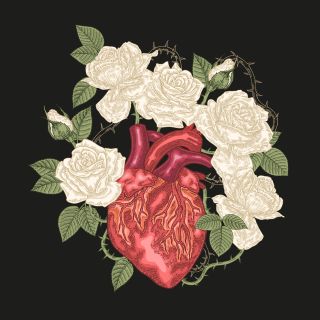Autism
An Autistic Perspective on "The Atlas of the Heart"
A Personal Perspective: Reading "The Atlas of the Heart" as an autistic woman.
Posted May 6, 2024 Reviewed by Devon Frye
Key points
- Autism acceptance should be the goal of neurotypicals rather than autism awareness.
- Autism acceptance involves listening to autistic people and connecting with them on a real level.
- "The Atlas of the Heart" offers a map to connection that can feel impossible for many autistic people.

In Brene Brown’s book, The Atlas of the Heart, she says “we need language and the grounded confidence to both tell our stories and be stewards of the stories that we hear. This is the framework for meaningful human connection.”
All my life, I have been capable of being a steward of the stories I hear. In fact, stories are my language. Stories are my greatest hyperfixation and although I may not remember your face or your name, I will never forget your story. I will love you through your story, without judgement.
I have collected thousands of stories now. War stories, rape stories, love stories, stories of great journeys met with joy, stories of insurmountable sorrow. And through all of this, I think I understand this world and human nature better than most. We live in a world of profound beauty and profound horror.
Yet I am an autistic woman, and even though I have found a hack to connect with other people that many autistic people don’t have—collecting people’s stories—I still live in a world in which I have never found any other humans that will be the steward of my stories. Thus, despite years of study of human nature and psychology, I have completely failed at real human connection.
I can be good at roles that aren’t reciprocal. I have been a good mother, I hope. I have been a good therapist. I can be a caretaker, but I have no idea how to reach out to others for reciprocity in a way that isn’t entirely off-putting.
In a recent group session, we talked about unmasking. Although autistic adults have 10 times the suicide rate of neurotypicals, if we are able to live authentic lives, to "unmask" and be ourselves with other humans, our suicide rates drop significantly. Thus, the goal is generally to unmask and live authentically.
Yet the topic of our recent group was: When do we have to mask to survive? Tragically, almost everyone said that despite the knowledge that unmasking is our path to happiness, they know that if they unmask in front of most people, they will be instantly judged and rejected.
What this means is that I am not alone among autistic adults. Many of us live without any real human connection that doesn’t involve pretending to be normal and hiding our stories. Many of us live masked and lonely lives.
Last month was Autism Awareness Month to most and Autism Acceptance Month for those of us who are passionate autism advocates. The reason we call it Autism Acceptance Month is that what autistic people need and want is real human connection—and that requires more than the allistic population being aware that we exist and being aware that we need help, usually from the perspective of neurotypical parents and professionals.
It requires that allistic people learn about us, our actually autistic lives, and accept us and our lives as they are without judgment. It requires that allistic people try to be stewards of our stories. This is why we need autism acceptance, not just autism awareness.
The Atlas of the Heart has been a pivotal book for me. It is like a guide to human emotion for an autistic person with deep alexithymia—an inability to experience and understand your own feelings. For me, this is one of the most profound parts of my autistic experience.
Ironically, I can empathize with and feel other people’s feelings more than I can understand my own. I can understand emotions like a neurological conceptual map, but I rarely know how I feel.
The Atlas of the Heart helped me understand emotion and the goal of human connection. Yet it also emphasized my understanding of my own isolation.
I can follow all the rules perfectly in this book, in all the books I have read. I can learn social penetration theory and study humans—yet I still can’t find someone who will share my story with me. There is something elusive to social skills and human connection that can never be learned in a book and always remains impossible for many autistic people.
Perhaps this is why so many of us go into psychology. I am part of numerous autistic therapist groups; there are quite a few of us now. I wonder if this is because we believe that if we can learn human behavior and study the theory of how to connect with humans, we can unlock the mystery of connection that almost every autistic person I know so desperately craves.
In fact, this is what generates almost much of autistic people's despair, the fact that many of us feel that can’t connect with other humans in a real way. This inability shapes every aspect of our lives—family, love, friendship, employment, and education.
Being autistic can be lonely. I am at a point in my life where the rejections I have endured from other humans are piled up like mountains around me. Friends who vanish and tell others tales of how difficult I am. Family members who run. Coworkers who have literally written “witch” on my door. The more I unmask, the more authentically l live, the larger the mountains of lost human connection become.
I know some autistic people who find the secret to human interaction. They find a Dungeons and Dragons group or gaming groups of other autistic people and they find real human connection. This is the goal; but for me and for many, it often seems impossible. Some autistic people find the masked connection sufficient, but others remain lonely and trapped by the confines of inauthentic connection.
For me, I have surrendered to isolation and have given up on ever really understanding the mystery of real connection. Instead, I am working on surrendering to loving without any expectation of return.
I will be a therapist and a mother. I will find solace in my husband, who I am closer to than I ever have been to anyone. I am also working on finding meaning in the small connections. The connection of the stories I tell with my writing. The connection I have with my dog. The connection I have with the stories so many have entrusted in me.
Maybe this is as good as it gets for an autistic woman with trauma. Maybe that makes me lucky.
References
Brown, Brene. (2021). The Atlas of the Heart. Random House; First Edition (November 30, 2021)
South M, Costa AP, McMorris C. Death by Suicide Among People With Autism: Beyond Zebrafish. JAMA Netw Open. 2021;4(1):e2034018. doi:10.1001/jamanetworkopen.2020.3401




